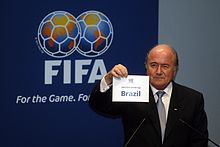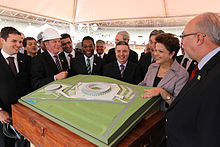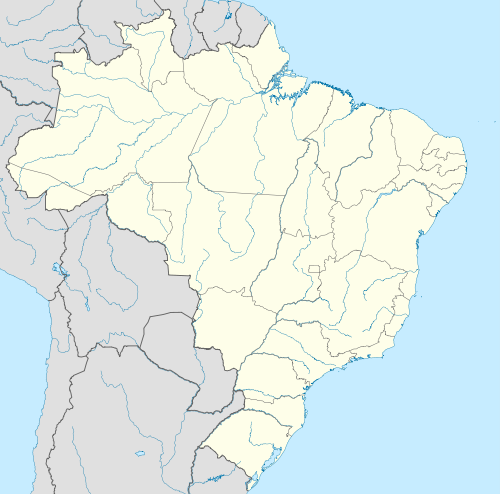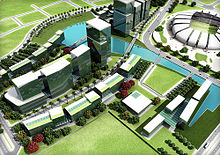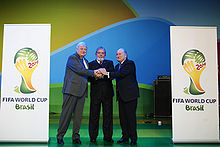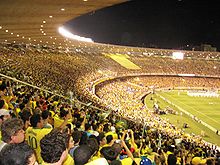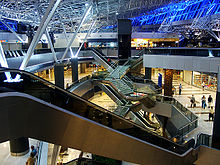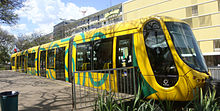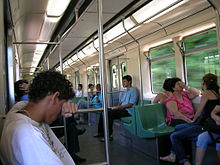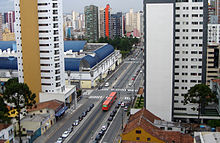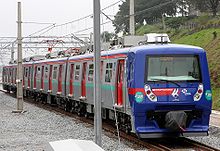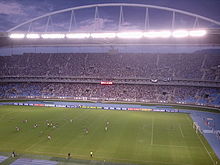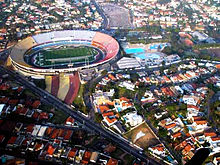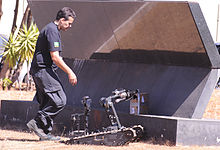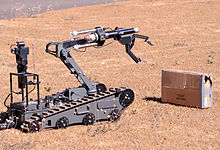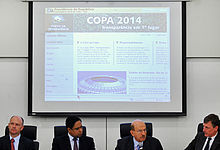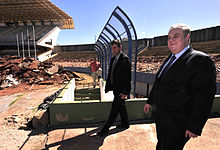- 2014 FIFA World Cup
-
2014 FIFA World Cup Copa do Mundo da FIFA
Brasil 2014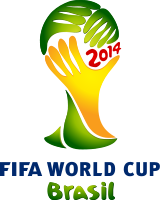
2014 FIFA World Cup logoTournament details Host country  Brazil
BrazilDates 12 June – 13 July (32 days) Teams 32 (from 5 or 6 confederations) Venue(s) 12 (in 12 host cities) ← 20102018 →The 2014 FIFA World Cup will be the 20th FIFA World Cup, an international association football tournament that will take place in Brazil from 12 June to 13 July 2014.[1]
This will be the second time the country has hosted the competition, the first being the 1950 FIFA World Cup. Brazil will become the fifth country to have hosted the FIFA World Cup twice, after Mexico, Italy, France and Germany. It will be the first World Cup to be held in South America since the 1978 FIFA World Cup in Argentina, the first time two consecutive World Cups are staged outside Europe and the first time two consecutive World Cups are staged in the Southern Hemisphere (the 2010 FIFA World Cup was held in South Africa).
Contents
Host selection
On 7 March 2003, FIFA announced that the tournament would be held in South America for the first time since Argentina hosted the competition in 1978, in line with its policy of rotating the right to host the World Cup amongst different confederations. On 3 June 2003, CONMEBOL announced that Argentina, Brazil, and Colombia wanted to host the 2014 World Cup finals.[2]
By 17 March 2004, the CONMEBOL associations had voted unanimously to adopt Brazil as their sole candidate.[3]
Brazil formally declared its candidacy in December 2006 and Colombia followed a few days later. The Argentina bid never materialized. On 11 April 2007, Colombia officially withdrew its bid, Francisco Santos Calderón the vice president of Colombia announced that instead Colombia would be hosting the 2011 FIFA U-20 World Cup. With this development, Brazil became the only official candidate to host the 2014 event.[4]
Brazil won the right to host the event on 30 October 2007 as the only country to enter a bid.[5]
Qualification
Main article: 2014 FIFA World Cup qualificationThe qualification draw for the 2014 World Cup was held at the Marina da Glória in Rio de Janeiro on 30 July 2011.[6] As the host nation, Brazil automatically qualifies for the tournament.
On 3 March 2011 FIFA decided to distribute places in the final tournament:[7]
The pairings in play-off games will be determined prior to the main draw, taking place on 29 July 2011 in Rio de Janeiro at a press conference following the meeting of the 2014 FIFA World Cup Brazil Organising Committee.[8]
Qualified teams
Team Order of
qualificationMethod of
qualificationDate of
qualificationFinals
appearanceConsecutive
World CupsLast
appearancePrevious best
performanceFIFA Ranking
at start of event Brazil
Brazil1st Host 30 Oct 2007 20th 20 2010 Winner (1958, 1962, 1970, 1994, 2002) Europe (UEFA)
Main article: 2014 FIFA World Cup qualification (UEFA)(53 teams competing for 13 berths)
South America (CONMEBOL)
Main article: 2014 FIFA World Cup qualification (CONMEBOL)(9 teams competing for 4 or 5 berths, playoff to determine exact number)
CONMEBOL will have 4 or 5 berths through qualification, with the top four teams in the group qualifying directly to the finals. The fifth place team from the group will play Asia's 5th place team in a home-and-away series to determine who will qualify.
In addition, Brazil automatically qualifies for the finals as host.
Africa (CAF)
Main article: 2014 FIFA World Cup qualification (CAF)(52 teams competing for 5 berths)
Asia (AFC)
Main article: 2014 FIFA World Cup qualification (AFC)(43 teams competing for 4 or 5 berths, playoff to determine exact number)
North, Central American and the Caribbean (CONCACAF)
Main article: 2014 FIFA World Cup qualification (CONCACAF)(35 teams competing for 3 or 4 berths, with playoff to determine exact number) There are 3 certain berths that would be allocated to the first 3 places in the final group. The 4th place team in the final group will play Oceania's winner in a home and away series to determine who will qualify for the finals.
Oceania (OFC)
Main article: 2014 FIFA World Cup qualification (OFC)(11 teams competing for 0 or 1 berth, playoff to determine exact number) The winner of OFC will play the 4th team from CONCACAF in a home and away series.
Venues
Seventeen cities showed interest in being chosen as World Cup host cities: Belém, Belo Horizonte, Brasília, Campo Grande, Cuiabá, Curitiba, Florianópolis, Fortaleza, Goiânia, Manaus, Natal, Porto Alegre, Recife, Olinda (a stadium would be shared by both cities), Rio Branco, Rio de Janeiro, Salvador and São Paulo.[9] Maceió withdrew in January 2009.
According to current FIFA practice, no more than one city may use two stadiums, and the number of host cities is limited between eight and ten. The Brazilian Football Confederation (CBF) requested permission to assign 12 cities hosting World Cup Finals.[10] On 26 December 2008, FIFA gave the green light to the 12-city plan.[11]
Even before the 12 host cities were selected, there were few doubts that the chosen venue for the final match will be the Maracanã in Rio de Janeiro, which also hosted the decisive match of the 1950 FIFA World Cup. Originally the CBF's intentions were to have the opening match at Estádio do Morumbi in São Paulo, the largest city in Brazil. However, on 14 June 2010 the stadium was excluded from hosting games in the tournament due to a failure to provide financial guarantees for the improvements needed to have it as an eligible venue.[12] At the end of August 2010, the CBF announced that the new Corinthians Stadium would host the matches in São Paulo.
The 12 host cities for the 2014 World Cup were announced on 31 May 2009.[13] Belém, Campo Grande, Florianópolis, Goiânia and Rio Branco were rejected. Half of the chosen host cities will have their games in brand new venues built specifically for the World Cup, while the stadium for the capital Brasilia was demolished and will be rebuilt, and the remaining five are upgrading their current stadia.
Group stage
All times listed are Brasília official time (UTC−03)
The official match schedule, which is subject to change, was announced at FIFA's headquarters in Zurich, Switzerland on 20 October 2011.[16]
Group A
Team Pld W D L GF GA GD Pts  Brazil
Brazil0 0 0 0 0 0 0 0 A2 0 0 0 0 0 0 0 0 A3 0 0 0 0 0 0 0 0 A4 0 0 0 0 0 0 0 0 12 June 2014
17:00Brazil 
Match 1  A2
A2Arena Corinthians, São Paulo
13 June 2014  A3
A3Match 2  A4
A4Estádio das Dunas, Natal
17 June 2014 Brazil 
Match 17  A3
A3Estádio Castelão, Fortaleza
18 June 2014  A2
A2Match 18  A4
A4Arena Amazonia, Manaus
23 June 2014 Brazil 
Match 33  A4
A4Estádio Nacional, Brasília
23 June 2014  A2
A2Match 34  A3
A3Arena Pernambuco, Recife Group B
Team Pld W D L GF GA GD Pts B1 0 0 0 0 0 0 0 0 B2 0 0 0 0 0 0 0 0 B3 0 0 0 0 0 0 0 0 B4 0 0 0 0 0 0 0 0 13 June 2014  B1
B1Match 3  B2
B2Arena Fonte Nova, Salvador
13 June 2014  B3
B3Match 4  B4
B4Arena Pantanal, Cuiabá
18 June 2014  B1
B1Match 19  B3
B3Estádio do Maracanã, Rio de Janeiro
18 June 2014  B2
B2Match 20  B4
B4Estádio Beira-Rio, Porto Alegre
23 June 2014  B1
B1Match 35  B4
B4Arena da Baixada, Curitiba
23 June 2014  B2
B2Match 36  B3
B3Arena Corinthians, São Paulo Group C
Team Pld W D L GF GA GD Pts C1 0 0 0 0 0 0 0 0 C2 0 0 0 0 0 0 0 0 C3 0 0 0 0 0 0 0 0 C4 0 0 0 0 0 0 0 0 14 June 2014  C1
C1Match 5  C2
C2Estádio Mineirão, Belo Horizonte
14 June 2014  C3
C3Match 6  C4
C4Arena Pernambuco, Recife
19 June 2014  C1
C1Match 21  C3
C3Estádio Nacional, Brasília
19 June 2014  C2
C2Match 22  C4
C4Estádio das Dunas, Natal
24 June 2014  C1
C1Match 37  C4
C4Arena Pantanal, Cuiabá
24 June 2014  C2
C2Match 38  C3
C3Estádio Castelão, Fortaleza Group D
Team Pld W D L GF GA GD Pts D1 0 0 0 0 0 0 0 0 D2 0 0 0 0 0 0 0 0 D3 0 0 0 0 0 0 0 0 D4 0 0 0 0 0 0 0 0 14 June 2014  D1
D1Match 7  D2
D2Estádio Castelão, Fortaleza
14 June 2014  D3
D3Match 8  D4
D4Arena Amazonia, Manaus
19 June 2014  D1
D1Match 23  D3
D3Arena Corinthians, São Paulo
20 June 2014  D2
D2Match 24  D4
D4Arena Pernambuco, Recife
24 June 2014  D1
D1Match 39  D4
D4Estádio das Dunas, Natal
24 June 2014  D2
D2Match 40  D3
D3Estádio Mineirão, Belo Horizonte Group E
Team Pld W D L GF GA GD Pts E1 0 0 0 0 0 0 0 0 E2 0 0 0 0 0 0 0 0 E3 0 0 0 0 0 0 0 0 E4 0 0 0 0 0 0 0 0 15 June 2014  E1
E1Match 9  E2
E2Estádio Nacional, Brasília
15 June 2014  E3
E3Match 10  E4
E4Estádio Beira-Rio, Porto Alegre
20 June 2014  E1
E1Match 25  E3
E3Arena Fonte Nova, Salvador
20 June 2014  E2
E2Match 26  E4
E4Arena da Baixada, Curitiba
25 June 2014  E1
E1Match 41  E4
E4Arena Amazonia, Manaus
25 June 2014  E2
E2Match 42  E3
E3Estádio do Maracanã, Rio de Janeiro Group F
Team Pld W D L GF GA GD Pts F1 0 0 0 0 0 0 0 0 F2 0 0 0 0 0 0 0 0 F3 0 0 0 0 0 0 0 0 F4 0 0 0 0 0 0 0 0 15 June 2014  F1
F1Match 11  F2
F2Estádio do Maracanã, Rio de Janeiro
16 June 2014  F3
F3Match 12  F4
F4Arena da Baixada, Curitiba
21 June 2014  F1
F1Match 27  F3
F3Estádio Mineirão, Belo Horizonte
21 June 2014  F2
F2Match 28  F4
F4Arena Pantanal, Cuiabá
25 June 2014  F1
F1Match 43  F4
F4Estádio Beira-Rio, Porto Alegre
25 June 2014  F2
F2Match 44  F3
F3Arena Fonte Nova, Salvador Group G
Team Pld W D L GF GA GD Pts G1 0 0 0 0 0 0 0 0 G2 0 0 0 0 0 0 0 0 G3 0 0 0 0 0 0 0 0 G4 0 0 0 0 0 0 0 0 16 June 2014  G1
G1Match 13  G2
G2Arena Fonte Nova, Salvador
16 June 2014  G3
G3Match 14  G4
G4Estádio das Dunas, Natal
21 June 2014  G1
G1Match 29  G3
G3Estádio Castelão, Fortaleza
22 June 2014  G2
G2Match 30  G4
G4Arena Amazonia, Manaus
26 June 2014  G1
G1Match 45  G4
G4Arena Pernambuco, Recife
26 June 2014  G2
G2Match 46  G3
G3Estádio Nacional, Brasília Group H
Team Pld W D L GF GA GD Pts H1 0 0 0 0 0 0 0 0 H2 0 0 0 0 0 0 0 0 H3 0 0 0 0 0 0 0 0 H4 0 0 0 0 0 0 0 0 17 June 2014  H1
H1Match 15  H2
H2Estádio Mineirão, Belo Horizonte
17 June 2014  H3
H3Match 16  H4
H4Arena Pantanal, Cuiabá
22 June 2014  H1
H1Match 31  H3
H3Estádio do Maracanã, Rio de Janeiro
22 June 2014  H2
H2Match 32  H4
H4Estádio Beira-Rio, Porto Alegre
26 June 2014  H1
H1Match 47  H4
H4Arena Corinthians, São Paulo
26 June 2014  H2
H2Match 48  H3
H3Arena da Baixada, Curitiba Knockout phase
Round of 16 Quarter-finals Semi-finals Final 28 June – Belo Horizonte Winner Group A 4 July – Fortaleza Runner-up Group B Winner Match 49 28 June – Rio de Janeiro Winner Match 50 Winner Group C 8 July – Belo Horizonte Runner-up Group D Winner Match 57 30 June – Brasília Winner Match 58 Winner Group E 4 July – Rio de Janeiro Runner-up Group F Winner Match 53 30 June – Porto Alegre Winner Match 54 Winner Group G 13 July – Rio de Janeiro Runner-up Group H Winner Match 61 29 June – Fortaleza Winner Match 62 Winner Group B 5 July – Salvador Runner-up Group A Winner Match 51 29 June – Recife Winner Match 52 Winner Group D 9 July – São Paulo Runner-up Group C Winner Match 59 1 July – São Paulo Winner Match 60 Third place Winner Group F 5 July – Brasília 12 July – Brasília Runner-up Group E Winner Match 55 Loser Match 61 1 July – Salvador Winner Match 56 Loser Match 62 Winner Group H Runner-up Group G Round of 16
28 June 2014  Winner Group A
Winner Group AMatch 49  Runner-up Group B
Runner-up Group BEstádio Mineirão, Belo Horizonte
28 June 2014  Winner Group C
Winner Group CMatch 50  Runner-up Group D
Runner-up Group DEstádio do Maracanã, Rio de Janeiro
29 June 2014  Winner Group B
Winner Group BMatch 51  Runner-up Group A
Runner-up Group AEstádio Castelão, Fortaleza
29 June 2014  Winner Group D
Winner Group DMatch 52  Runner-up Group C
Runner-up Group CArena Pernambuco, Recife
30 June 2014  Winner Group E
Winner Group EMatch 53  Runner-up Group F
Runner-up Group FEstádio Nacional, Brasília
30 June 2014  Winner Group G
Winner Group GMatch 54  Runner-up Group H
Runner-up Group HEstádio Beira-Rio, Porto Alegre
1 July 2014  Winner Group F
Winner Group FMatch 55  Runner-up Group E
Runner-up Group EArena Corinthians, São Paulo
1 July 2014  Winner Group H
Winner Group HMatch 56  Runner-up Group G
Runner-up Group GArena Fonte Nova, Salvador Quarter-finals
4 July 2014  Winner Match 49
Winner Match 49Match 57  Winner Match 50
Winner Match 50Estádio Castelão, Fortaleza
4 July 2014  Winner Match 53
Winner Match 53Match 58  Winner Match 54
Winner Match 54Estádio do Maracanã, Rio de Janeiro
5 July 2014  Winner Match 51
Winner Match 51Match 59  Winner Match 52
Winner Match 52Arena Fonte Nova, Salvador
5 July 2014  Winner Match 55
Winner Match 55Match 60  Winner Match 56
Winner Match 56Estádio Nacional, Brasília Semi-finals
8 July 2014
17:00 Winner Match 57
Winner Match 57Match 61  Winner Match 58
Winner Match 58Estádio Mineirão, Belo Horizonte
9 July 2014
17:00 Winner Match 59
Winner Match 59Match 62  Winner Match 60
Winner Match 60Arena Corinthians, São Paulo Third place match
12 July 2014
17:00 Loser Match 61
Loser Match 61Match 63  Loser Match 62
Loser Match 62Estádio Nacional, Brasília Final
13 July 2014
16:00 Winner Match 61
Winner Match 61Match 64  Winner Match 62
Winner Match 62Estádio do Maracanã, Rio de Janeiro Logo
The logo is called "Inspiration", and was created by Brazilian agency Africa. The design stems from an iconic photograph of three victorious hands together raising the world's most famous trophy. As well as depicting the humanitarian notion of hands interlinking, the portrayal of the hands is also symbolic of the yellow and green of Brazil warmly welcoming the world to their country. The logo was unveiled at a ceremony held in Johannesburg on 8 July 2010.[17]
FIFA and the Brazil LOC invited 25 Brazilian-based agencies to submit designs for the Official Emblem of the 2014 tournament and the task of picking the winner was awarded to a high-profile seven-strong judging panel consisting of CBF chairman Ricardo Teixeira, FIFA executive secretary Jérôme Valcke, supermodel Gisele Bündchen, architect Oscar Niemeyer, writer Paulo Coelho, singer Ivete Sangalo, and designer Hans Donner.[18]
Brazilian graphic designer Alexandre Wollner has criticized the design, suggesting it resembles a hand covering a face in shame, and the process through which it was chosen, having a jury that excluded professional graphic designers.[19]
Infrastructure
Stadiums
The CBF estimates that the cost of construction and remodeling of stadiums[20] alone will be approximately over R$1.9 billion ($1.1 billion, £ 550 million).[21] In addition to the stadium upgrades and renovations, there will be millions more spent on basic infrastructure needs to get the country ready.
When informed of the decision to host the tournament, CBF President Ricardo Teixeira said: "We are a civilized nation, a nation that is going through an excellent phase, and we have got everything prepared to receive adequately the honor to organize an excellent World Cup." Teixeira was on hand at FIFA's headquarters in Zürich when the announcement was made.
"Over the next few years we will have a consistent influx of investments. The 2014 World Cup will enable Brazil to have a modern infrastructure," Teixeira said. "In social terms will be very beneficial. Our objective is to make Brazil become more visible in global arenas," he added. "The World Cup goes far beyond a mere sporting event. It's going to be an interesting tool to promote social transformation."
Airports
On 31 August 2009 the state airport management agency Infraero unveiled a R$ 5.3 billion (approx. €3 billion, £ 2 billion) investment plan[22] to upgrade airports of ten of the venue cities, increasing their capacity and comfort for the hundreds of thousands of tourists expected for the Cup. Natal and Salvador are excluded because their upgrade works have been recently completed. A significant amount (55.3%) of the money will be spent overhauling the airports of São Paulo and Rio de Janeiro. The investment figure covers works to be carried out up to 2014.
The announcement by Infraero came in reply to criticism made by the Brazilian General Aviation Association, a grouping of private aircraft owners, that Brazil's airports currently could not cope with the World Cup inflow. The vice-president of the association, Adalberto Febeliano, told reporters that more than 500,000 football fans were expected, with each one taking between six and fourteen flights during the tournament to get to the games in various cities.[23] In May 2010, the Government of Brazil changed the bidding legislation to allow more flexibility to Infraero.[24]
Metro, Monorail, and Light rail
In 2012, the Porto Alegre International Airport will have a monorail line that connects the airport with Aeroporto metro station of Greater Porto Alegre Metro. That will connect the airport with downtown Porto Alegre and the stadium.[25]
In 2014, the São Paulo International Airport will have a metro line that connects the airport with downtown São Paulo and the stadium. The new line integrates the São Paulo Metro and Greater São Paulo Metro.[26]
In 2014, the Salvador International Airport will have a metro line that connects the airport with downtown Salvador and the stadium. The new line integrates the Salvador Metro.[27]
In 2014, the Fortaleza International Airport will have a metro line that connects the airport with downtown Fortaleza and the stadium. The new line integrates the Fortaleza Metro.[28]
In 2014, the Manaus International Airport will have a monorail line that connects the airport with downtown Manaus and the stadium.[29]
In 2014, the Brasília International Airport will have a light rail line that connects the airport with downtown Brasília and the stadium. The new line integrates the Brasília Metro.[30]
In 2014, the Cuiabá International Airport will have a light rail line that connects the airport with downtown Cuiabá and the stadium.[31]
In 2014, the Natal International Airport will have a light rail line that connects the airport with downtown Natal and the stadium.[32]
BRT
In 2014, Belo Horizonte International Airport will have a Bus Rapid Transit (BRT) line that connects the airport with downtown Belo Horizonte and the stadium. The BRT system will integrates the Belo Horizonte Metro.
In 2014, the Curitiba International Airport will have a BRT line that connects the airport with downtown Curitiba and the stadium. The future BRT line of International Airport will add to the Rede Integrada de Transporte of Curitiba, one of the largest BRT systems of the world.
In 2014, the Recife International Airport will have a BRT line, that connects the airport with downtown Recife, metropolitan area, and the stadium. The BRT system will integrates the Recife Metro.
In 2014, the Rio de Janeiro International Airport will have a BRT line that connects the airport with Barra da Tijuca, a neighborhood in the West Zone of the city, which is the headquarters of 2016 Olympic Games. This will connect the BRT station in Barra da Tijuca with the South Zone (Copacabana, Ipanema, Leblon, etc), the stadium, and the rest of the city is through the Rio de Janeiro Metro.
Development programme
The Brazilian federal government has earmarked R$ 3 billion (€ 1.8 billion, £ 1.1 billion) for investment in works relating to the 2014 World Cup, and intends to release a package of works, entitled the FIFA World Cup PAC (Portuguese acronym for Growth Acceleration Programme). According to the Brazilian minister of cities, Márcio Fortes, the bulk of funds should go to works pertaining to the tournament itself, but the total figure will only be defined after a meeting with representatives of the municipalities that will host the matches.
"This is only an initial figure. We have not set a figure yet. These R$3 billion will allow us to take the first step. The total value of projects is not known yet. We are going to hold talks with mayors to learn which projects are priorities," said the minister. The funds will be supplied by Pró-Transporte, a financing programme funded by the Severance Pay Indemnity Fund (FGTS) whose regulation was passed last year by the fund's Board of Curators.
According to Fortes, several city councils have already contacted the ministry and showed interest in partnership for carrying out infrastructure work turned exclusively to the Cup that will be held in Brazil. "For some time now, the city councils that will host the matches have been contacting us. The city councils have had meetings with FIFA and several projects were outlined. Our approach consists of dealing only with projects exclusively turned to the Cup. Our goal right now is not to solve transport-related issues in the city. We are going to help solve the issues pertaining to the events," he stated. According to the minister, another factor to be analysed by the Ministry of Cities is usefulness and sustainability of the investment after the competition is over. "We are not going to deal with huge projects. The cheapest and most efficient means of transport will be used. Of course, each case will be analysed separately," he explained.
Fortes stated that the PAC of the Cup is going to include partnerships with city councils and state governments, as well as some partnerships with the private sector. "The keyword is partnership. The federal government will not undertake anything by itself. It will be similar to the infrastructure PAC, in which we already have partnerships with city councils and state governments, as well as public-private partnerships. We are going to review the type of investment proposed, analyse their size, and the need for private sector participation, which may take place in different ways. The private sector may build and then lease the assets, or perhaps operate them. All of that will be discussed," he stated.
The minister also informed that preparations for the World Cup already include the creation of a line of financing for renewing the bus fleet across the country. The line will be made available by the Brazilian Federal Savings Bank with total funds of R$1 billion (€ 600 million, £ 375 million).[33]
Maracanã projects
The Maracanã Stadium, in the city of Rio de Janeiro, has been chosen for the final match. The Maracanã was inaugurated in the 1950 World Cup. For the 2014 World Cup, among other adaptations, a new cover will be built. The project also includes construction of a building for parking, above the lines of Supervia and subways, with 3,500 parking spaces. The estimated investment is R$ 460 million. According to the study of Sinaenco, there is a need to improve the visibility for spectators in the first few rows behind the cabins in the Maracanã, redesign the facilities for people with disabilities, and provide general health reform.
The project may also provide for the restoration of Quinta da Boa Vista and the Museum of São Cristóvão, in addition to redevelopment and revitalization of neighborhoods including Tijuca. The Engenhão stadium, completed for the 2007 Pan American Games, has a capacity of 45,000 people and will serve as a training ground for the World Cup.
An investment of R$ 5 billion is required to meet the requirements that Rio de Janeiro faces in the final tournament and other games, covering three areas: logistics (roads, railways, ports, waterways and airports), energy (generation and transmission of electric power, petroleum, natural gas and renewables) and social and urban (light, sanitation, housing, subways and water resources). In relation to the Rio de Janeiro Metro, the Ministry of Transport has held a public hearing regarding the extension of its lines. The line for the new project is 13.5 km (8.4 mi) long, and should cross the South Zone of the city, carrying around 200,000 passengers per day between six metro stations.[34]
Corinthians projects
The New Corinthians Stadium, in the city of São Paulo, has been chosen for the opening ceremony. São Paulo's chances of staging the opening ceremony of soccer's 2014 World Cup improved after FIFA accepted a guarantee that SC Corinthians Paulista's new stadium will be completed in time for the tournament. The stadium, being built by Odebrecht SA, will cost US$ 522 million, according to Corinthians President Andres Sanchez. BNDES, the national development bank, pledged US$ 400 million and the city of São Paulo will provide a property fund worth US$ 400 million.
On a statement on the Corinthians website, Ricardo Teixeira, president of the World Cup local organising committee and the Brazilian Football Confederation, said: "This approval -- in record time, less than a year -- is the result of efforts by the government of São Paulo, particularly the Governor Geraldo Alckmin and Mayor Gilberto Kassab."[35] FIFA's approval of the project to build a new home for Brazil's biggest soccer club by revenue, which originally had a cost estimate of US$ 1.2 billion, was required for São Paulo to host World Cup games.
In June 2011, then sports minister Orlando Silva said in an interview that the federal government would tell tournament organizer FIFA that São Paulo, Salvador, Belo Horizonte and Brasília are eligible to stage the opening ceremony. FIFA will announce the venue in October. Sanchez said: "I said before that if Corinthians could fulfill all the requirements of FIFA, the opening of the World Cup would be in São Paulo. Corinthians gave the guarantees required by FIFA, so the opening will be in São Paulo."[35] Most of the funding for investment in airports, stadiums, ports and urban transportation before the World Cup will come from the government.[36]
Host cities
Region 1950 2014 Host cities in 1950 and 2014 Host cities in 2014 only Central-West 0 2 — Brasília, Cuiabá North 0 1 — Manaus Northeast 1 4 Recife Fortaleza, Natal, Salvador South 2 2 Curitiba, Porto Alegre Southeast 3 3 Belo Horizonte, Rio de Janeiro, São Paulo In 1950, host cities of the World Cup were concentrated in the southeast and south.[37] In 2014, the host cities are more evenly distributed. Each host city is the capital of its state. The selection covers all the main regions of Brazil and as a result the tournament will require significant long-distance travel for teams. Brazil is the fifth largest nation in the world by geographical size.[38] Although Brazil straddles the equator, all the proposed match venues are in the southern hemisphere, meaning that the games will be held in the winter period (although most venues for the tournament are situated in the tropics). The cold front comes from Antarctica causing cold weather in the south and central part of the country, and rainy weather in the north. However, the future stadiums are being prepared for these conditions.[39]
FIFA agreed to increase the number of host cities from ten to 12 because of the size of Brazil. "In the very beginning, ten cities were going to be chosen, but thanks to the influence of [CBF president] Ricardo Teixeira and the interest of the whole country, we agreed increasing the number to twelve," said FIFA president Sepp Blatter. Teixeira briefed FIFA members about all 17 candidate cities.[40]
A reported US$1 billion (approx. £650 million) is to be approved for the repair, upgrading and maintenance of Brazilian stadiums. However, aiming to build "state of the art" stadiums and, therefore, increasing their chances to be part of 2014's tournament, some Brazilian states are searching for expertise abroad. Recently delegations from Recife and Porto Alegre, for example, visited the Amsterdam Arena in order to understand the formula which made that stadium highly profitable. Amsterdam Arena, the home of AFC Ajax, has developed and is offering its expertise on the multi-use-purpose stadium concept and management. Amsterdam Arena has been developed to accommodate not only football matches but also concerts and events. Amsterdam Arena is currently developing two projects for Brazil: Recife/Olinda and Porto Alegre (Grêmio).[41]
Security plan
The Brazilian government said authorities will have an efficient security plan in place for the 2014 FIFA World Cup. Justice Minister José Eduardo Cardoso said in an interview with Brazilian radio stations that "the 2014 World Cup will be a very safe event." One of the security measures that the government plans to implement is facial recognition software, in which Brazilian police will use futuristic Robocop-style glasses fitted with facial recognition equipment to identify and root out troublemakers at the 2014 FIFA World Cup.
A small camera fitted to the glasses can capture 400 facial images per second and send them to a central computer database storing up to 13 million faces. Minister Cardoso said the government is developing a public safety plan that will be unveiled "soon." The 2014 FIFA World Cup will be held in 12 cities throughout Brazil. Played every four years, the month long tournament from June to July is expected to attract hundreds of thousands of fans from all over the world.[42]
Secretary José Ricardo Botelho is facing perhaps the most important mission of his life as a civil servant. Heading the newly created Special Secretariat for the Security of Large Events, Botelho has the task of ensuring the safety of Brazilians and tourists during the 2014 FIFA World Cup. To this end, he has developed what might be called an obsession: to integrate the security forces of a country with continental dimensions like Brazil. To prove that the goal will be achieved, he draws on History, his other obsession: "People who have a history know where they want to go."
Integration is the keyword in the Strategic Security Plan prepared for the 2014 FIFA World Cup. In addition to ensuring quick responses, the plan provides for an integrated security system that can be left as a legacy to the country. In total, an estimated 45,000 men linked to the security forces will be mobilized, not to mention reinforcements from the Brazilian Armed Forces and Civil Defense. "The country does not need to create anything new, but just to integrate its existing tools," he said. According to José Ricardo Botelho, the databases of federal and state security forces will be integrated with the Interpol database, which means connecting Brazil to 188 countries. In addition, the government has already sent documents to the United States, Germany, England, Holland, South Africa, Poland and Argentina requesting information about terrorists, "troublemakers" and hooligans.
"We want to work proactively rather than defensively; hence the importance of technology. We are linking everything so that when a person fitting this profile applies for a visa, for example, we will already have the first barrier in place. But in the case of a country for which an entry visa is not required, when the person gets to our borders he or she will not be allowed into Brazil. But what if he or she does? We are working with state-of-the-art equipment to identify these people. We do not want them among us," says the commissioner. Technology pervades all discussions of the Security Plan for the World Cup. Teams from the Special Secretariat for the Security of Large Events are visiting he 12 host cities to follow civil works in the stadiums that will be hosting World Cup games. Anti-bomb groups are monitoring the works up to delivery, in order to ensure that no artifacts are hidden inside pillars and foundations.
In addition to security in the stadiums, the Secretariat for the Security of Large Events is keeping a close eye on fan fests. Each host city will have an operational command center with representatives of the police, the Armed Forces, the Fire Department and Civil Defense. There, decision-making promises to be quick. The central command headquarters will be located in Brasília and Rio de Janeiro.[43]
The country is training of 53,000 public safety professionals for the 2014 FIFA World Cup will go through courses such as "Public safety without homophobia" and application of human rights in policing, and training in Brazilian Sign Language and foreign languages. The professionals will be trained in 3 categories: experts, so-called multipliers (which help to transfer knowledge to other professionals) and operators. The selection of training for professionals will be made by state governments of the venues of the games, and classroom courses are held in academias and training centers of military and civil police, and fire department.[44]
Anti-fraud plan
On 11 June 2010, the federal government launched a program to protect the tenders for work in preparation for the 2014 World Cup and the 2016 Olympic Games against the possibility of fraud. The plan, known as Jogando Limpo (Fair Play), includes a series of guidelines and nuggets of advice so that the government institutions, and also the tax authorities and common citizens themselves, may identify and denounce attempts at fraud against the tenders. The program, which was launched by the Ministries for Justice and for Sport, also plans the establishment of a group dedicating to monitoring tenders, to protect them against the threat of fraud and also to avoid delays in construction work.
This initiative, also boosted by the General Financial Controller of the Union (Controladoria Geral da União), also plans a campaign to make the people aware of the need to pay attention to possible fraud and to always denounce the cases. The program emphasizes measures against cartels and possible agreements between competing companies to set prices above market levels, in an attempt to raise the value of the contracts with the state. "Nothing can be worse than someone taking advantage of these two great opportunities to commit crimes. This is a world phenomenon," said the Minister for Justice, Luiz Paulo Barreto, during the ceremony to launch the program.
"The businesspeople could be entering with an agreement on prices, in order to compete in these tenders. This is something that needs to be tackled. We need to promote fair play also in our tenders," Barreto added. "Fair play is something we would expect from a country intending to host events of this size," he added. Barreto also said that, between 2007 and 2010, there were a total of 265 search and seizure warrants issued in Brazil to tackle the crime of cartel formation. In the same period over 100 people were preventively arrested for the same crime, and currently an additional 251 people are being investigated.[45]
Tax breaks
Brazil's federal government announced on 17 May 2010 that it shall be granting tax breaks for the construction and refurbishment of the stadiums for the 2014 World Cup. In a note, the Ministry for the Treasury said that it shall be "granting tax exemption to the stadiums of the World Cup, which shall not need to pay Industrialized Products Tax (Imposto sobre Produtos Industrializados - IPI), Importation Tax (Imposto de Importação - II) or social contributions (PIS/COFINS)."
In addition, the 12 cities that shall be hosting the World Cup matches shall be able to grant exemption from State Value Added Tax (Imposto sobre Circulação de Mercadorias e Serviços - ICMS) on all operations involving merchandise and other goods for the construction or the refurbishment of the stadiums. "Conditional on the cumulative concession of the benefits involving Importation Tax, IPI and PIS/COFINS, the exemption of ICMS on imports shall only be applicable if the goods do not have a similar product produced nationally," the note informed, adding that this decision shall be made feasible through a Law or Provisional Measure.
In September 2009, the Brazilian Development Bank (Banco Nacional de Desenvolvimento Econômico e Social - BNDES) opened a credit line of R$ 4.8 billion (approx. €2.7 billion, £ 1.75 billion) for the World Cup stadiums. Each host city shall be able to finance up to R$ 400 million (approx. €225 million, £ 145 million) or 75% of the project, with bank funds.[46]
See also
References
- ^ "Pot allocations for the Preliminary Draw". FIFA. 2011-07-27. http://www.fifa.com/worldcup/preliminarydraw/news/newsid=1480389/index.html. Retrieved 2011-07-28.
- ^ "Argentina, Brazil and Colombia want 2014 World Cup". English.people.com.cn. 2003-01-19. http://english.people.com.cn/200301/19/eng20030119_110398.shtml. Retrieved 2011-10-09.
- ^ Blatter reiterates wish that the 2014 World Cup be in Brazil[dead link]
- ^ "Brazil confirms bid - Colombia withdraws". Fifa.com. http://www.fifa.com/worldfootball/releases/newsid=123706.html. Retrieved 2011-10-09.
- ^ "Brazil confirmed as 2014 hosts". FIFA. 2007-10-30. Archived from the original on 2007-10-31. http://web.archive.org/web/20071031182910/http://www.fifa.com/worldfootball/news/newsid=625695.html. Retrieved 2007-10-30.
- ^ "Draw for World Cup qualifiers at Marina da Glória in Rio". globoesporte.com. 8 December 2010. http://globoesporte.globo.com/futebol/copa-do-mundo/noticia/2010/12/sorteio-das-eliminatorias-da-copa-sera-na-marina-da-gloria-no-rio.html. Retrieved 21 January 2011.
- ^ FIFA.com - Financial report presented, Brazil 2014 slots & host countries decided[dead link]
- ^ "2014 FIFA World Cup Brazil™ Preliminary Draw". fifa.com. http://www.fifa.com/worldcup/preliminarydraw/index.html. Retrieved 12 April 2011.
- ^ "FIFA's Inspection Report" (PDF). http://www.fifa.com/mm/document/affederation/mission/fwc2014%5fbrazil%5fbid%5finspection%5freport%5fen%5f24491.pdf. Retrieved 2011-10-09.
- ^ "FIFA wants to decide which cities will house World Cup 2014", Sportsya[dead link]
- ^ "Mondiali 2014 in dodici città" (in Italian). Tuttomercatoweb. http://www.tuttomercatoweb.com/?action=read&id=133956.
- ^ "Sao Paulo dropped for 2014". SBS. 2010-06-17. http://theworldgame.sbs.com.au/2014-world-cup/news/1008887/Sao-Paulo-dropped-for-2014. Retrieved 2010-06-17.
- ^ "Host Cities for Brazil 2014 to be announced in May". FIFA.com (Fédération Internationale de Football Association). 12 March 2009. http://www.fifa.com/worldcup/brazil2014/news/newsid=1037180.html. Retrieved 6 June 2009.[dead link]
- ^ "Cadeiras sao retiradas do Maracanã para conclusao da primeira etapa das obras pra a Copa do Mundo - Chairs are removed from Maracanã concluding the upgrading first step". Noticias.r7.com. 1990-01-06. http://noticias.r7.com/rio-de-janeiro/noticias/cadeiras-sao-retiradas-e-maracana-conclui-primeira-etapa-das-obras-para-a-copa-do-mundo-2014-20101006.html. Retrieved 2011-10-09.
- ^ "Brazil 2014" (in Brazilian Portugese). esportes.terra.com.br. 30 May 2011. http://esportes.terra.com.br/futebol/brasil2014/noticias/0,,OI5156738-EI10545,00-Apos+prelecao+e+reza+obras+do+estadio+corintiano+tem+inicio.html. Retrieved June 7, 2011.
- ^ "2014 FIFA World Cup Brazil Match Schedule". fifa.com. http://www.fifa.com/mm/document/tournament/competition/01/52/99/91/2014fwc_matchschedule.pdf. Retrieved 21 October 2011.
- ^ "Journey to Brazil 2014 begins". FIFA.com. http://www.fifa.com/worldcup/brazil2014/media/newsid=1270440.html#journey+brazil+2014+begins. Retrieved 2010-07-11.[dead link]
- ^ Shanahan, Mark; Goldstein, Meredith (10 July 2010). "Gisele picks logo, shops with Tom - The Boston Globe". Boston.com. http://www.boston.com/ae/celebrity/articles/2010/07/10/gisele_picks_logo_shops_with_tom/. Retrieved 2010-07-11.
- ^ "Designer critica logo da Copa 2014: "É uma porcaria" - Terra - Esportes". Terramagazine.terra.com.br. http://terramagazine.terra.com.br/interna/0,,OI4553699-EI6583,00-Designer+critica+logo+da+Copa+E+uma+porcaria.html. Retrieved 2010-07-11.
- ^ All Stadiums for Brazil 2014 World Cup[dead link]
- ^ "Brazil Named as World Cup 2014 Host". Brazil.homesgofast.com. http://brazil.homesgofast.com/news/brazil-named-as-world-cup-2014-host-I544/. Retrieved 2011-10-09.
- ^ Rittner, Daniel; Braga, Paulo Victor (31 August 2009). "Infraero vai gastar R$5 bi em reforma de aeroportos" (in Portuguese). Valor Econômico: pp. A4.
- ^ "Future airports of Brazil". Asiaone.com. http://www.asiaone.com/News/Latest%2BNews/Sports/Story/A1Story20080725-78670.html. Retrieved 2011-10-09.
- ^ "Law reduces bureaucracy". V-brazil.com. 2010-06-08. http://www.v-brazil.com/world-cup/2014/law-bureaucracy-airport-building-easier/. Retrieved 2011-10-09.
- ^ "Copa 2014: Aeromóvel de Porto Alegre começa a sair do papel". Portal 2014. 2011-07-22. http://www.portal2014.org.br/noticias/7576/COPA+2014+AEROMOVEL+DE+PORTO+ALEGRE+COMECA+A+SAIR+DO+PAPEL.html. Retrieved 2011-10-15.
- ^ "Secretário diz que abertura da Copa pode render R$ 30 bi a São Paulo". Portal 2014. 2011-09-28. http://www.copa2014.org.br/noticias/8112/SECRETARIO+DIZ+QUE+ABERTURA+DA+COPA+PODE+RENDER+R+30+BI+A+SAO+PAULO.html. Retrieved 2011-10-12.
- ^ "Edital para ampliação do metrô de Salvador deve sair em 45 dias". Portal 2014. 2011-08-18. http://www.copa2014.org.br/noticias/7799/EDITAL+PARA+AMPLIACAO+DO+METRO+DE+SALVADOR+DEVE+SAIR+EM+45+DIAS.html. Retrieved 2011-10-12.
- ^ "Copa do Mundo deixará legado para o futuro". O POVO Online. http://www.opovo.com.br/hotsite/copa2014/intervencoes-urbanas.html. Retrieved 2011-10-13.
- ^ "Obra do monotrilho de Manaus é aprovada". Portal 2014. 2011-10-15. http://www.portal2014.org.br/noticias/7684/OBRA+DO+MONOTRILHO+DE+MANAUS+E+APROVADA.html. Retrieved 2011-08-04.
- ^ "Metrô Leve de Brasília - VLT". GDF Portal do Cidadão. 2009. http://www.vlt.df.gov.br/. Retrieved 2011-10-12.
- ^ "Governo aceita VLT em Cuiabá e metrô em Salvador". Portal 2014. 2011-09-09. http://www.portal2014.org.br/noticias/7969/GOVERNO+ACEITA+VLT+EM+CUIABA+E+METRO+EM+SALVADOR.html. Retrieved 2011-10-13.
- ^ "Fátima Bezerra diz que VLT está garantido com a Copa 2014". Nominuto.com. 2009-06-03. http://www.nominuto.com/noticias/politica/fatima-bezerra-diz-que-vlt-esta-garantido-com-a-copa-2014/32942/. Retrieved 2011-10-16.
- ^ "Brazil-Arab news Agency - World Cup". .anba.com.br. http://www2.anba.com.br/noticia_esportes.kmf?cod=8705153. Retrieved 2011-10-09.
- ^ nosso time. "Rio and the final match of 2014 FIFA World Cup". Copa2014.org.br. http://www.copa2014.org.br/noticias/296/OS+DESAFIOS+DO+RIO+DE+JANEIRO+PARA+A+COPA+2014.html. Retrieved 2011-10-09.
- ^ a b "Sao Paulo Hopes of Hosting 2014 FIFA World Cup Opening Ceremony Boosted". Sportconnect. 2011-07-14. http://www.isportconnect.com/index.php?option=com_content&view=article&id=7512:sao-paulo-hopes-of-hosting-2014-fifa-world-cup-opening-ceremony-boosted&catid=23:stadia--venues-arena-infrastructure&Itemid=32. Retrieved 2011-10-22.
- ^ website group (2011-07-14). "Sao Paulo Hopes of Hosting 2014 FIFA World Cup Opening Ceremony Boosted". Sportconnect. http://www.isportconnect.com/index.php?option=com_content&view=article&id=7512:sao-paulo-hopes-of-hosting-2014-fifa-world-cup-opening-ceremony-boosted&catid=23:stadia--venues-arena-infrastructure&Itemid=32. Retrieved 2011-10-22.
- ^ dom, 31/05/09. "Host cities in 1950 FIFA World Cup". Colunas.globoesporte.com. http://colunas.globoesporte.com/memoriaec/2009/05/31/sedes-da-copa-de-1950-voltam-no-mundial-de-2014/. Retrieved 2011-10-09.
- ^ Selection - Regions of Brazil[dead link]
- ^ "Winter in Brazil during the FIFA World Cup". Brcactaceae.org. http://www.brcactaceae.org/clima.html. Retrieved 2011-10-09.
- ^ "Host cities - World Cup". BBC News. 2009-05-31. http://news.bbc.co.uk/sport2/hi/football/internationals/8075256.stm. Retrieved 2011-10-09.
- ^ "Brazil Insight - Dutch and English website". Brazilinsight.nl. http://www.brazilinsight.nl/index.php?option=com_content&task=view&id=1001&Itemid=2. Retrieved 2011-10-09.
- ^ Steven McLoud (2011/10/13). "Brazil Guarantees Efficient Security Plan for 2014 FIFA World Cup". Diálogo. http://www.dialogo-americas.com/en_GB/articles/rmisa/features/sports/2011/10/13/feature-ex-2593. Retrieved 2011-10-21.
- ^ our team. "ntegration is the keyword in the Strategic Security Plan". World Cup Portal. http://www.copa2014.gov.br/noticia/integration-keyword-strategic-security-plan?language=en. Retrieved 2011-10-21.
- ^ Brazilian police without homophobia (Portuguese)
- ^ our team. "Anto-fraud plan in Brazil". Copa2014.org.br. http://www.copa2014.org.br/en/news/3784/GOVERNMENT+LAUNCHES+ANTIFRAUD+PLAN+FOR+WORLD+CUP+AND+OLYMPIC+GAMES.html. Retrieved 2011-10-09.
- ^ "Brazil shall grant tax breaks for 2014 stadiums". Portal 2014. 2010-05-18. http://www.copa2014.org.br/en/news/3028/BRAZIL+SHALL+GRANT+TAX+BREAKS+FOR+2014+STADIUMS.html. Retrieved 2007-10-30.
External links
2014 FIFA World Cup Stadia Mineirão (Belo Horizonte) • Estádio Nacional de Brasília (Brasília) • Arena Pantanal (Cuiabá) • Arena da Baixada (Curitiba) • Castelão (Fortaleza) • Arena Amazonia (Manaus) • Arena das Dunas (Natal) • Estádio Beira-Rio (Porto Alegre) • Cidade da Copa (Recife) • Maracanã (Rio de Janeiro) • Arena Fonte Nova (Salvador) • New Corinthians Stadium (São Paulo)
FIFA World Cup Tournaments - Uruguay 1930
- Italy 1934
- France 1938
- Brazil 1950
- Switzerland 1954
- Sweden 1958
- Chile 1962
- England 1966
- Mexico 1970
- West Germany 1974
- Argentina 1978
- Spain 1982
- Mexico 1986
- Italy 1990
- United States 1994
- France 1998
- South Korea & Japan 2002
- Germany 2006
- South Africa 2010
- Brazil 2014
- Russia 2018
- Qatar 2022
Finals Squads Qualification Other articles - Awards
- Balls
- Broadcasters
- Droughts
- Finals
- Goalscorers
- Hat-tricks
- History
- Hosts
- Mascots
- Milestone goals
- Official songs
- Penalty shoot-outs
- Qualification
- Records
- Red cards
- Referees
- Team appearances
- Trophy
- Video games
1Decisive match of a final group stage. 2No qualification took place as places were given by invitation only.International association football FIFA · World Cup · Confederations Cup · U-20 World Cup · U-17 World Cup · Olympics · Minor tournaments · World Rankings · Player of the Year · FIFA Ballon d'Or · Teams · Debuts · Competitions · Federations · CodesAsia 
Africa North,
Central America
and CaribbeanSouth America Oceania Europe Non-FIFA Games All-Africa Games · Asian Games · CARIFTA Games · East Asian Games · Francophonie Games · IOIG · Lusophony Games · Mediterranean Games · Pan American Games · Pan Arab Games · Pacific Games · South Asian Games · Southeast Asian GamesSee also International women's football. Brazil
BrazilHistory First inhabitants · Colonization · Empire · Old Republic · Vargas Era · Second Republic · Military rule · ContemporaryGeography Regions · States · Mesoregions · Microregions · Municipalities · Islands · Coastline · Climate · Environment · Extreme points · Protected areas · CapitalsGovernment Constitution · Federal government · President · National Congress · Foreign relations · Law · Law enforcement · MilitaryPolitics Economy Society Demographics · People · Languages · Religion · Immigration · Education · Health · Crime · Social issues · Largest cities · ApartheidCulture Categories:- 2014 FIFA World Cup
- FIFA World Cup tournaments
- 2014 in association football
- International football (soccer) competitions hosted by Brazil
- Scheduled sports events
Wikimedia Foundation. 2010.

